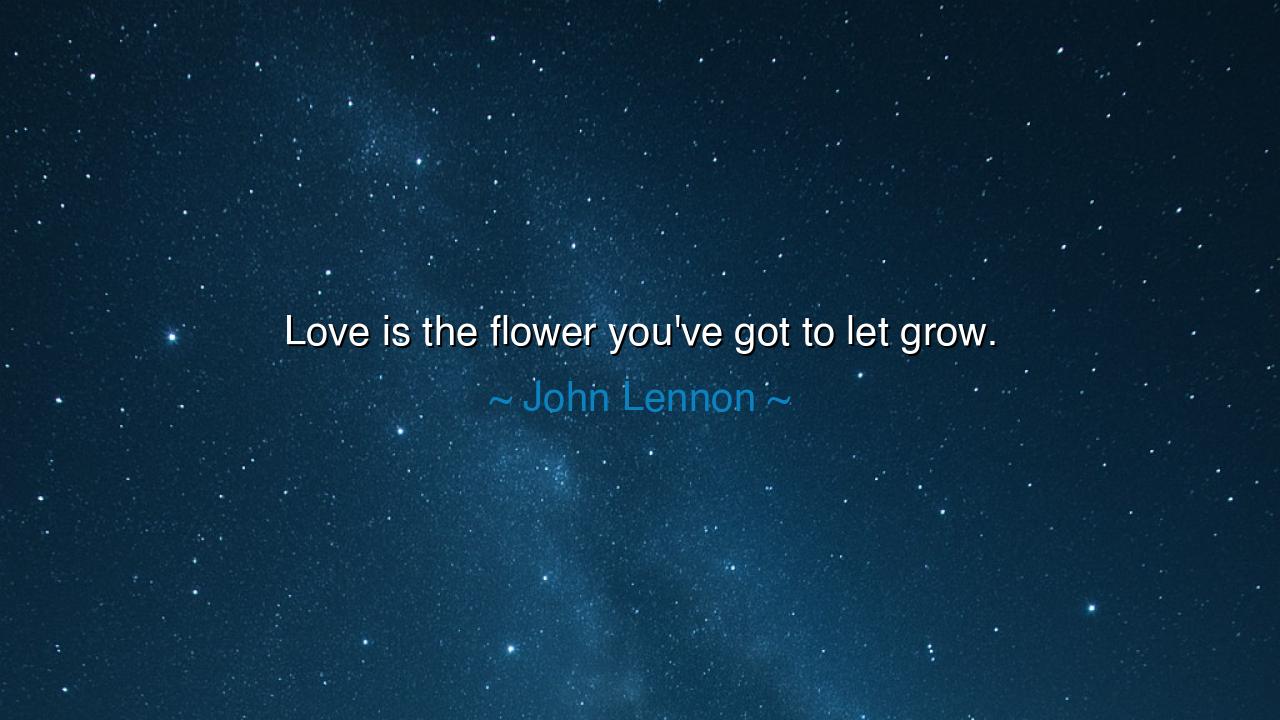
Love is the flower you've got to let grow.






"Love is the flower you've got to let grow." These powerful words by John Lennon encapsulate the deep, nurturing nature of love and the patience required to allow it to flourish. In likening love to a flower, Lennon speaks to the inherent fragility and beauty of love, while also emphasizing the care and attention it requires to bloom. To love truly is not simply to declare affection, but to nurture that love with the same gentleness and patience as one would tend to a delicate blossom. Just as a flower needs sunlight, water, and time to grow, so too does love need space, understanding, and the right conditions to thrive.
In the teachings of the ancients, love was often considered a divine gift, something that had to be cultivated with care. The Greeks, in their many philosophies, saw love as both a spiritual and earthly force. Plato spoke of love as a means of ascending to higher truths, while Aristotle believed that love, particularly in the form of friendship, was essential for a flourishing life. However, both philosophers emphasized that love was not instantaneous; it had to be cultivated and nurtured over time. To love, they believed, was to work toward something greater than oneself, to foster mutual respect and growth. In this way, Lennon’s words resonate with ancient wisdom: love requires time and care to reach its fullest potential.
Consider the relationship between Socrates and Xanthippe, his wife. Although they are often portrayed as an unlikely couple, with Xanthippe known for her fiery temperament, their bond was one that grew and endured. Socrates, in his wisdom, understood that love in a relationship is not about instant perfection, but about growth and mutual understanding. He gave his attention to their relationship, not seeking to change Xanthippe’s nature, but to cultivate their bond. The love between them may not have been a romantic ideal, but it was real, evolving through patience and care. Socrates’ recognition that love is a process mirrors Lennon’s idea of love as something that needs to be allowed to grow, not rushed or forced.
Similarly, the love between Antony and Cleopatra is often idealized as a passionate and all-consuming affair, but their relationship also required time and patience to navigate the tumultuous political landscape. Cleopatra, with her intelligence and charm, captivated Antony, but their love was constantly tested by the realities of power, war, and betrayal. Yet, despite these trials, their love endured, showing that love—like a flower—must be tended with care and attention. Even in the face of their eventual downfall, their love remained remarkable for its intensity and for the way they managed to protect and nurture it despite the forces that threatened to tear them apart. Their love, in the end, was not simply about passion—it was about growth through adversity.
Lennon’s metaphor of love as a flower also speaks to the impermanence of life and love. Just as a flower blooms and eventually withers, so too does love go through cycles of growth, blossoming, and even decay. To love fully is to accept that love, like a flower, may not always last forever, but that its beauty lies in its ability to grow and flourish in the time that it exists. The love we give and receive enriches us, leaving behind memories that shape us, even when the flower eventually fades. This impermanence does not make love less valuable; on the contrary, it makes each moment of love even more precious. In nurturing love, we make it stronger, and it becomes a part of our journey—something that stays with us, even after the moment has passed.
The lesson Lennon imparts is one of patience, commitment, and care. To truly love is to recognize that love does not bloom instantly, but needs time and attention. It requires understanding, nurturing, and the willingness to let it evolve naturally. We must create the right conditions for love to grow—space, trust, and dedication. Love, like a flower, needs the right environment to flourish, and it will grow in ways that we may not always expect. But in this growth, we experience the fullness of life, the beauty of connection, and the joy of sharing our hearts with another.
In your own life, reflect on the love you give and receive. Are you allowing it the time and space it needs to grow? Are you nurturing it with the attention and patience required for it to bloom? Just as a gardener tends to a delicate flower, tending to your relationships with care and understanding will allow them to grow into something lasting and beautiful. Love fully, but also with the knowledge that it is a process, one that demands commitment and nurturing. Allow love to grow, and in doing so, you will find that it transforms not only the one you love, but also yourself, enriching your life in ways that will last long after the flower has bloomed.






AAdministratorAdministrator
Welcome, honored guests. Please leave a comment, we will respond soon